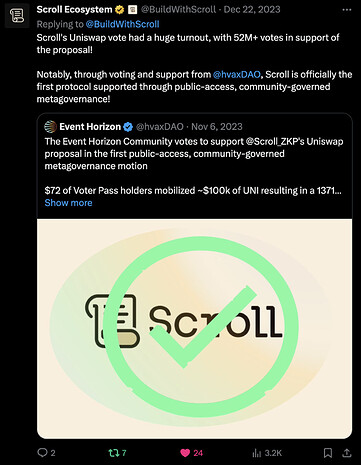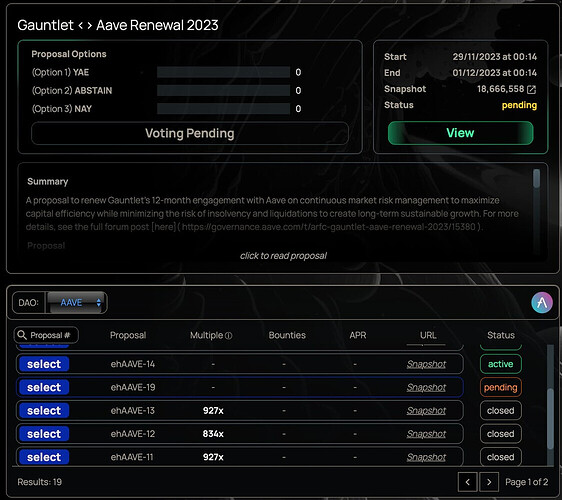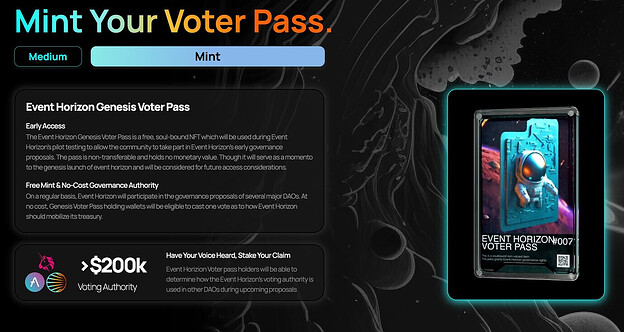Introduction
With the aim of enfranchising the tens of thousands of small voters, this proposal suggests we delegate (not grant) between 150,000-300,000 GTC to a public access-voter block. Gitcoin community members may mint a free, soul-bound Voter Pass which allows them to take part in mobilizing this voter pool. As detailed further below, this model:
-
Grants a clear and significant voice to retail voters regardless of their financial means
-
Incentives participation with additional governance authority, not inflationary rewards
-
Incentives participants interested in governance itself, not financial gain
Rationale
A delegation, not a grant, of 150,000-300,000 GTC would place the Event Horizon community around the 5th largest delegate. We think this places a fair amount of power into the 3rd pillar of governance, namely retail (the other two being team and individual delegates).
Problem
Today, retail voters very likely hold some of the greatest ideas, contributions and desire to affect change, yet they have no meaningful voice to function as a platform for their values. As a result, turnout is incredibly low and their ideas never see the light of day. This issue is self-evident and widely recognized across almost every DAO. Users suffer from lack of voice, but protocols also suffer from a massive constraint in their potential thought capital and as a result the DAO doesn’t leverage the full power of collective cognition. This is a problem which can be solved without expense by simply treating the 99% of retail users no differently than any currently extant delegate.
Background
Event Horizon is a public good.
It is a public-access metagovernance block. DAOs today rely exclusively on individuals and company entities to serve as network delegates. However, this isn’t the only option. While individual delegates certainly add incredible value to the Gitcoin ecosystem, so would a governance allotment dedicated to the greater body of smaller retail participants.
In this regard, Event Horizon slots into the Gitcoin ecosystem in a similar fashion to a standard delegate, however, rather than the block voting based on the decision of one individual, it votes with the collective cognition of potentially thousands of individual voter pass holders.
This serves two functions:
-
It provides a clear and designated voice for smaller, retail voters.
-
It drives participation through a game-theoretic process called Implicit Delegation.
One of the greatest barriers to participation is a lack of voice due to lack of capital. Implicit delegation and public access governance changes this.
Implicit Delegation is a model by which the full public governance block mobilizes in favor of the consensus of those who do vote, thereby implicitly delegating the authority of those who don’t vote.
When participation is low… each voter receives a larger slice of the public access pie. This means the fewer people there are voting, the more incentive there is for someone new to come and participate.
When participation is high… there are more voters splitting the same pie, however, retail participation is high, which is a win for the ecosystem.
Implicit Delegation represents an effort to offer a new paradigm around means of influence. A shift from today’s entirely capital-centric to a more retail-friendly participation-centric model.
Where Direct Governance allocates influence along the lines of capital, and Explicit Delegation allocates influence along the lines of popularity (which often reflects capital), Implicit Delegation allocates influence to those who care most: people showing up to vote. Because the carrot is influence, it attracts governance-interested retail, not capital-interested retail, more on that below.
Because the entirety of the block is always mobilized, those who are most vested are rewarded for their participation by having a larger share of the voting pie. In this regard, EventHorizon’s model leans into a systemic lack of participation to create a solution.
Benefits compared to Token Incentivized Governance:
While token rewards for participation hold legitimate merit and are an intuitive remedy for low turnout, it has limitations.
- Misaligned Incentives: Token-based incentives attract returns-interested parties. However, when it comes to governance, participation is most valuable when it comes from those interested in participating not payout. Implicit delegation directly appeals to these individuals as it rewards those who participate, not with capital, but with greater voting power.
Added Thought Capital: in line with the notion above, there are likely thousands of community members each holding both strong ideas and valuable contributions for the ecosystem, but simply lack enough voice to justify participation. Through Implicit Delegation, any community member of the Gitcoin ecosystem has an opportunity to have their voice heard, bringing thousands more minds and ideas to the surface.
-
Inflationary: While token rewards drive participation at the expense of inflation, Implicit delegation simply leverages its game theory model to increase incentive to vote in the form of a greater voting share. This does not cost the token any inflation, nor the treasury any GTC.
-
Non-scalable: Token-based rewards are finite and require a constant drain of GTC funds to continue driving participation. As the ecosystem scales, and more participants join, greater and greater sums of GTC will be needed to continue fueling growth. Implicit delegation has no cost, and its balanced game theory functions with no burn. As more retail voters join, more GTC could be delegated to the community block, however, again, this is not a cost as the GTC tokens are still retained by the treasury.
Specification
Past Performance:
The above is not just theory. The Event Horizon community is already actively meta-governing Uniswap, AAVE, Arbitrum, Compound, and ShapeShift. In fact, in 2 of the 3 latest Uniswap votes, the Event Horizon community was the 11th largest voter in the Uniswap Ecosystem. Event Horizon has also recently voted as the 11th largest delegate in recent Aave votes. While there is still quite a gap between Event Horizon and 10th place, interestingly enough this position serves as a sort of DMZ between individual delegates above, and retail below. This dynamic does, however, highlight an issue we are addressing. Retail needs more of a voice. Event Horizon aims to lift them up. Individual, organization AND retail delegation are all valuable and mutually inclusive, three symbiotic pillars for a strong ecosystem.
Since its inception just a few months ago, the Event Horizon protocol has processed over 100 metagovernance proposals and placed over $7,000,000 of governance authority and enfranchisement directly into the hands of the retail voter, a feat not seen anywhere else in the DAO space. Across all proposals for which the Event Horizon Community has participated, the community’s cumulative voter footprint is on pace to exceed $10,000,000 in the coming weeks. Some more metrics worth highlighting:
Number of Meta-Proposals Passed >150
Our community members have participated in and passed over 100 metagovernance proposals, each corresponding to Uniswap or AAVE base layer proposals.
Voter Participation: >30%
Over thirty percent of our community members have participated in our metagovernance proposals. Some participants have voted as many as 63 times in under 5 months. Check out the latest info on our leaderboard: EventHorizon.vote/leaderboard
Average Authority Mobilized per Participating Passholder: >$100,000 (and counting)
For the cost of $3 in gas, each participating passholder has mobilized an average of just over $150,000 in Uniswap, Compound, ShapeShift, Arbitrum and AAVE governance authority across all metagovernance proposals passed.
Average Authority Mobilized Multiple: 33,333x (and growing)
The average pass holder minted their voter pass for ~$3 in gas. When compared to the $100,000 in average authority mobilized, each member has mobilized over 33,333x their gas cost of admission in blue-chip governance authority.
Notable metagovernance proposals:
- ehUNI-1 – Deploy Uniswap V3 on Scroll: The Event Horizon Community voted to support the deployment of Uniswap on Scroll. 24 voters participated each mobilizing >$4,000 of Uniswap authority: https://x.com/BuildWithScroll/status/1738249059616592223?s=20
- ehUNI-3 – Lower Onchain Proposal Threshold: The Event Horizon Community voted to support the University of Michigan Blockchain Club’s proposal to lower the Uniswap proposal threshold from 2.5M UNI to 1M UNI. The initiative is intended to make proposal creation more accessible. This metagovernance proposal mobilized >$175,000 of UNI and achieved a record-high vote multiple of 8758x for those retail voters who participated.
Mechanisms:
- Duplication: Event Horizon Automatically copies proposals published on the Snapshot of included DAOs, in this case Gitcoin, into its simplified UI metagovernance dashboard:
- Metagovernance: The Event Horizon voter pass holders conduct a meta-layer vote to assess the community’s desired base-layer proposal outcome. NOTE: voter passes are free to mint and the Event Horizon will subsidize the gas cost for Gitcoin community members. EventHorizon.vote/mint
- Base-Layer Voting: The Event Horizon community wallet automatically votes in favor of the desired outcome determined by the passholders.
Steps to Implementation
The primary step to implementation would be the delegation of GTC to the EventHorizonCommunity.eth. From there, Event Horizon will facilitate the processing of metagovernance proposals as it has been for many other DAOs.
Again, this would not be a grant and funds would remain in the foundation-controlled wallet. Consider us a delegate like any of the other talented delegates currently supporting the Arbitrum ecosystem.


